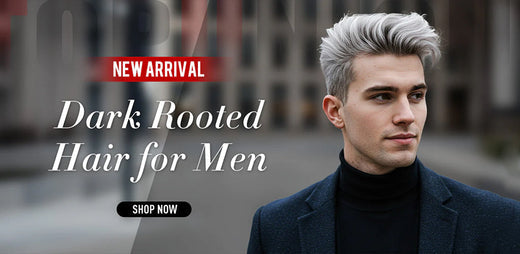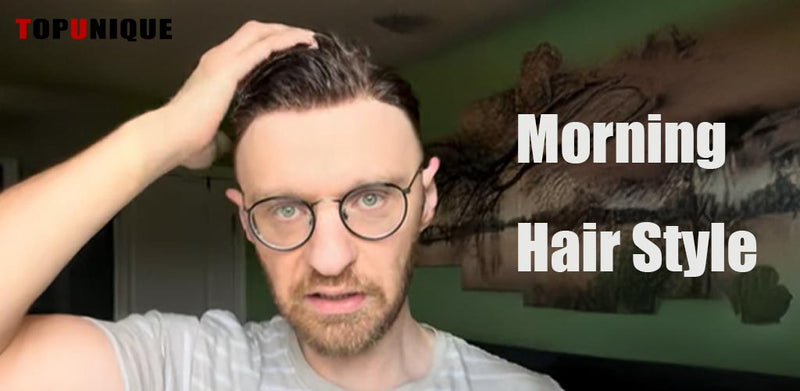Table of Contents

When considering the question, “How long does a toupee last?” there are two main aspects to address: how long a toupee stays securely in place for each installation, and the overall lifespan of the toupee itself. Both aspects depend on several factors, ranging from how frequently the toupee is worn to the materials used in its construction. In this blog, we’ll explore these factors in detail to help you better understand what to expect when it comes to the longevity of a toupee.
Part 1: How Long Does a Toupee Last on the Head Per Installation?
The length of time a toupee can stay securely in place on the head during each installation is influenced by several factors, such as your experience level with wearing hair systems, the bonding method used, and your lifestyle.
1. Experience Level as a Toupee Wearer
For new toupee wearers, adjusting to the sensation of having a hairpiece on the scalp can take time. You might experience itching or discomfort during the initial period, leading you to remove the toupee more frequently. This is completely normal and part of the adjustment process. As you become more accustomed to wearing a hair system, you’ll likely feel more comfortable keeping it in place for longer periods, potentially for days or even weeks at a time.
Experienced wearers, who have adapted to the feeling of wearing a toupee, generally find it easier to leave the toupee on for longer stretches without feeling the need to remove or readjust it.

2. The Bonding Method
The bonding method you use plays a crucial role in determining how long your toupee can stay in place. There are many types of adhesives and tapes on the market, each offering different bonding strengths and durations.
Tape: For temporary wear, toupee tape can be used. It typically holds the hair system securely in place for anywhere from a day to a week, depending on the quality of the tape and environmental factors like humidity.
Glue: If you prefer a stronger hold, hairpiece glue is an option. High-quality adhesives can keep your toupee in place for up to four weeks or even longer. The strength of the glue you choose should depend on how long you want to wear the toupee without removing it.

3. Sweat and Activity Levels
Your lifestyle also plays a role in determining how long your toupee lasts between installations. If you sweat heavily or engage in activities that cause moisture to accumulate on your scalp, such as working out frequently, the adhesive may break down faster, causing the toupee to loosen sooner than expected. For those who lead active lifestyles, stronger adhesives designed to withstand moisture and sweat are recommended.
Part 2: The Lifespan of a Toupee
The overall lifespan of a toupee depends on several factors, including the base material, hair density, ventilation technique, and hair color. With proper care, some toupees can last several months, while others may need replacement sooner.
1. Base Material and Structure
The material used for the base of the toupee has a significant impact on its durability. Generally, the thicker the base, the longer it will last. Here’s a look at different base materials and their typical lifespans:
Skin Base: A skin base is made of polyurethane and varies in thickness. The thicker the skin, the longer it lasts. For example, a 0.12mm skin base can last around six months with proper care, while an ultra-thin 0.02mm skin base may only last for a month before needing to be replaced. Thinner skin bases provide a more natural appearance but sacrifice durability.
Lace Base: Lace bases are highly breathable and provide a natural hairline, but they tend to have a shorter lifespan compared to skin bases, usually lasting around 2-4 months, depending on the lace thickness and the care they receive.
Monofilament Base: Monofilament bases are durable and can last up to 6-9 months. They are stronger than lace bases and provide a balance between realism and longevity.

2. Hair Density
The hair density of the toupee also affects its lifespan. In general, hair systems with higher hair density tend to last longer than those with lighter hair densities. This is because the thicker hair provides more coverage, reducing the amount of wear and tear on individual hair strands. Lower-density toupees, while offering a more natural look for some users, may not last as long due to the reduced volume of hair that covers the base.
3. Ventilation Technology
The technique used to attach the hair to the base is another factor that influences how long the toupee will last. There are several common ventilation techniques:
Double Knotting: This method is the most durable, as the hair is tied to the base using two knots. A toupee with double knotting can last longer than those with single knots, as the hair is less likely to shed.
Single Knotting: While providing a more natural appearance, single knots are not as durable as double knots, meaning the hair may shed more quickly.
V-looping and Injection: These advanced techniques provide a very natural look, but they are less durable than knotted hair systems. V-looped or injected toupees may need to be replaced more frequently, as the hair is more prone to shedding.
4. Hair Color
Surprisingly, hair color can also impact how long a toupee lasts. Darker hair tends to last longer because it undergoes fewer chemical processes during production. Lighter hair colors, such as blonde or gray, require more bleaching and chemical treatments, which can weaken the hair and shorten the lifespan of the toupee.

Conclusion
In conclusion, the question of how long a toupee lasts can be answered in two parts: how long it stays securely on the head and how long it lasts overall before needing to be replaced. The duration of wear between installations depends on factors such as your experience level, the bonding method, and your lifestyle. The lifespan of the toupee itself depends on the base material, hair density, ventilation technique, and hair color.
By selecting the right toupee for your needs and maintaining it properly, you can enjoy a natural, long-lasting hair solution that boosts your confidence and keeps you looking your best.









